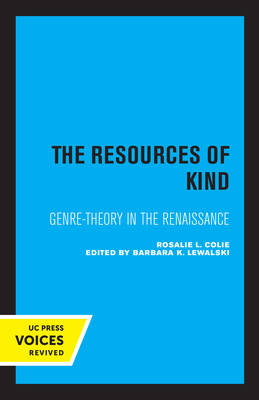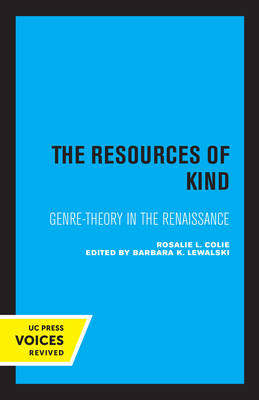
Bedankt voor het vertrouwen het afgelopen jaar! Om jou te bedanken bieden we GRATIS verzending (in België) aan op alles gedurende de hele maand januari.
- Afhalen na 1 uur in een winkel met voorraad
- In januari gratis thuislevering in België
- Ruim aanbod met 7 miljoen producten
Bedankt voor het vertrouwen het afgelopen jaar! Om jou te bedanken bieden we GRATIS verzending (in België) aan op alles gedurende de hele maand januari.
- Afhalen na 1 uur in een winkel met voorraad
- In januari gratis thuislevering in België
- Ruim aanbod met 7 miljoen producten
Zoeken
€ 67,95
+ 135 punten
Uitvoering
Omschrijving
The Resources of Kind: Genre-Theory in the Renaissance, edited by Barbara K. Lewalski, presents the four Una's Lectures delivered at Berkeley in 1972 by Rosalie Littell Colie, whose sudden death prevented their further expansion into the major study she had planned. Even in this form, the essays offer a landmark contribution to Renaissance literary history and critical theory. With Colie's characteristic erudition and elegance, they emphasize the richness and flexibility of Renaissance genre, challenging the modern prejudice that genre constrains originality. Instead, she shows how genres act as frames of communication and metaphors for human understanding, shaping both literature and the apprehension of reality itself. Colie identifies a central tension in Renaissance genre theory between the strict differentiation of kinds and the conception of literature as a totalizing paideia that could incorporate all knowledge. This tension opened the way for the elevation of "minor" or unconventional forms--emblems, epigrams, prose fiction, philosophical poems, dialogues--and for the invention of new forms like the essay, the picaresque novel, and the historical epic. Her lectures trace the assimilation of small forms into larger works and demonstrate how masterpieces such as Paradise Lost and King Lear achieve greatness through their encyclopedic blending of multiple genres, presenting the full range of human experience. Though unfinished, these lectures encapsulate Colie's wide-ranging scholarship and her enduring influence, offering both new insights into Renaissance genre and a model of intellectual speculation that continues to shape the field. This title is part of UC Press's Voices Revived program, which commemorates University of California Press's mission to seek out and cultivate the brightest minds and give them voice, reach, and impact. Drawing on a backlist dating to 1893, Voices Revived makes high-quality, peer-reviewed scholarship accessible once again using print-on-demand technology. This title was originally published in 1973.
Specificaties
Betrokkenen
- Auteur(s):
- Uitgeverij:
Inhoud
- Aantal bladzijden:
- 138
- Taal:
- Engels
- Reeks:
Eigenschappen
- Productcode (EAN):
- 9780520334571
- Verschijningsdatum:
- 19/08/2022
- Uitvoering:
- Paperback
- Formaat:
- Trade paperback (VS)
- Afmetingen:
- 140 mm x 216 mm
- Gewicht:
- 185 g

Alleen bij Standaard Boekhandel
+ 135 punten op je klantenkaart van Standaard Boekhandel
Beoordelingen
We publiceren alleen reviews die voldoen aan de voorwaarden voor reviews. Bekijk onze voorwaarden voor reviews.









